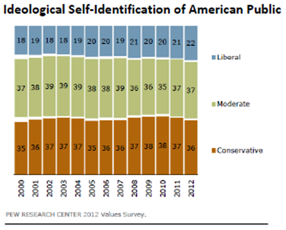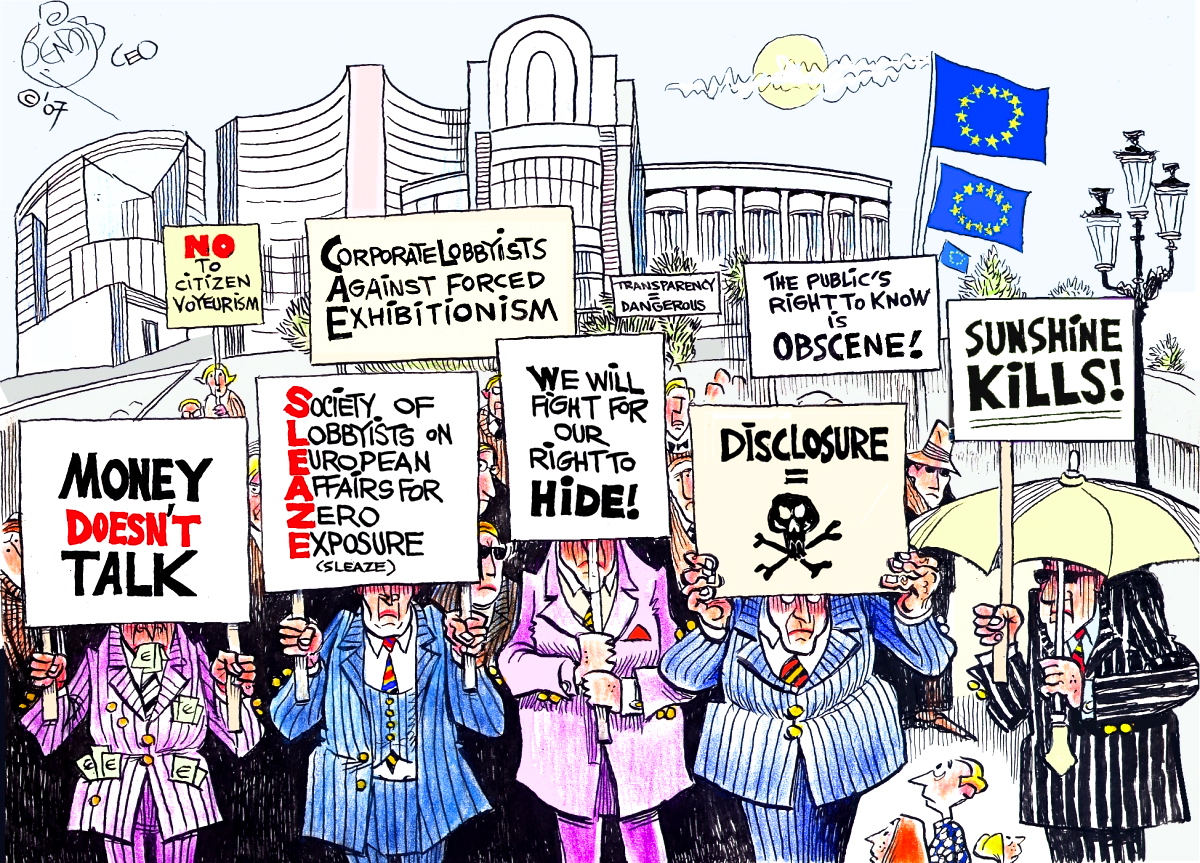
The liberal narrative is not working.
Telling the American people that the government is not the devil that the GOP makes it out to be — that it is full of good people who bring you Social Security, Medicare, air-traffic controllers and park rangers — is getting us no more than some flexibility in allocating an unduly tight budget. It is time to go populist.
A major reason for the limited support liberals gain (even within the Democratic Party) is a basic misunderstanding of the way democratic politics work. Liberals console themselves, when they learn that for every American voter who identities as a liberal there are two conservatives, by saying, Ah, you don't get it; studies show that the majority only subscribe to conservative philosophies but they are 'operational' liberals. The majority support gun control, the social safety nets, climate protection, and many other liberal programs. As long as we remind the people of what the government really does, they will vote liberal.
This lovely thought does not have a leg to stand on, because people cannot vote for these programs. Instead, they must cast one vote that covers all the various programs and issues — domestic and foreign — before them. In doing so, they do not build some kind of index where they award five points for promoting Social Security, four for Medicare, three for parks, minus two for farm subsidies, and so on. Rather, voters fall back on political philosophy as a shortcut to reach their summary choice — the only one they have. And when it comes to general philosophical leanings, the overwhelming majority of the population lean conservative, as these graphs show.
On the philosophical level, the liberal approach does not play for many because it is too abstruse. When CNN asked a group of Democratic voters to recite the Republican message, they did so crisply, on the spot. When they same group was asked to recite the Democrats' message — they hemmed and hawed. If liberals could get away with taking the mirror-opposite view of the one the GOP is selling, they would be home free. But they dare not say the government is good, the devil is private, or the bigger the government the more it serves. Instead they engage in a complicated dance.
Thus, President Obama stated in the 2013 State of the Union, "It's not a bigger government we need, but a smarter government that sets priorities and invests in broad-based growth." Previously he told Americans, "I believe government should be lean; government should be efficient. I believe government should leave people free to make the choices they think are best for themselves and their families, so long as those choices don't hurt others." He followed in the footsteps of the popular Bill Clinton, who made his mark by declaring that the age of big government was over and ending welfare as we knew it. Both cases reflect the pressure on liberals to kiss the we-don't-favor-big-government ring before they can hope that the majority of Americans will give their message a chance.
More important, many government activities have become indefensible. Reports are published daily showing very large parts of the government are no longer serving the people and that they have been captured by special interests. One reads on Monday that Congress voted 394 to 1 to extend a subsidy program started in 1925 to ensure there would be enough helium for zeppelins, but now serves only a few private interests.
On Tuesday, that casino and private prison corporations who declare themselves real-estate investment trusts (REITs) although they have nothing to do with the real-estate business have gained IRS approval not to pay taxes on their profits.
On Wednesday, that a hospital chain requires its physicians to hospitalize 50 percent of the seniors who set foot into its ERs and automatically orders a battery of tests for them whether they need it or not, all charged to Medicare.
On Thursday, that when 19 of the largest Wall Street firms violated anti-fraud laws, rather than face criminal prosecution, they were made to promise not to break the law in the future. When they broke it anyway, in 51 different cases, no charges were filed and the offenders were simply made to repeat their promise to behave.
And on Friday one is reminded that not one of the fine people who brought us the finical crisis that lost millions their homes, jobs, and life savings have been jailed, including those who hired people to systematically commit massive fraud. And that that the banks we bailed out are still too big to fail, while their executives got big bonuses and are carry on brewing the next financial bubble. On it goes. Moreover, one must assume that for every government capture by special interests the press reveals, there are quite a few others not aired.
The revulsion one feels on reading these and many other such reports is enough to either turn people cynical to the point of abandoning any hope for politics and public life, looking instead for shortcuts to make it their own way rich quick — or, to make them ready to join protest politics. No wonder many found that the Tea Party spoke to their anger. True, the movement also attracted some people who hold racial prejudices and oppose gay marriage. But it is a serious mistake to hold that this is the main attraction, or ignore the Tea Party's key message: namely, that the government is not working for us, is not responsive to our needs, is not hearing our voices.
Instead of dismissing Tea Partiers as a bunch of redneck hicks, liberals should tell them they are half right — the government all too often is not serving the people — but have the wrong address for their very justified anger. It should be directed at the special interests that have captured and perverted the government rather than at the government itself, which can readily serve good or nefarious purposes. This narrative speaks both to the liberals who seek reform and major segments of the angry masses. (Indeed, polls show that 21 percent of Occupy Wall Street supporters self-identify as "conservative" and one of 10 Americans support both the Tea Party and OWS).
Readers may wonder why, if it is true that large segments of the public are open to populist appeals, did Occupy Wall Street fare so poorly? First, because it had no clear narrative and was mainly an expression of a very diffuse sentiment; second, because it mixed populist with liberal messages; third, because it was unclear who the bad guys are — Wall Street? The bankers? The one percent? The System? A populist narrative must clearly focus on special interests, even admitting that they may include some with liberal feathers. And it must call for liberating the government from special interests so that it might once again serve the people. This is a thesis that could unite liberals with many others who have many very sound reasons to be furious.
The next step, a major first step to return the government to one for the people, by the people, is actually a relative easy one to outline: rolling back the negative impact of the Supreme Court's Citizens United decision. However, few will be ready to support major limitations on the private monies gushing into elections until they have come to see the source of our malaise. It is as simple — the message ought to be simple — as this: The culprit is not the government but the unfettering of the special interests who all too often have captured its reins.
Originally published by The Atlantic.
3 WAYS TO SHOW YOUR SUPPORT
- Log in to post comments















